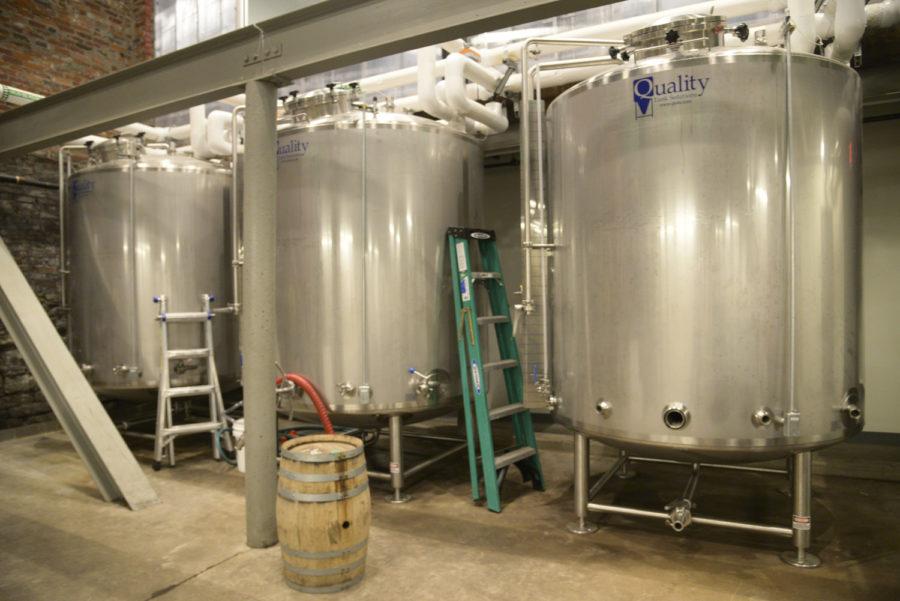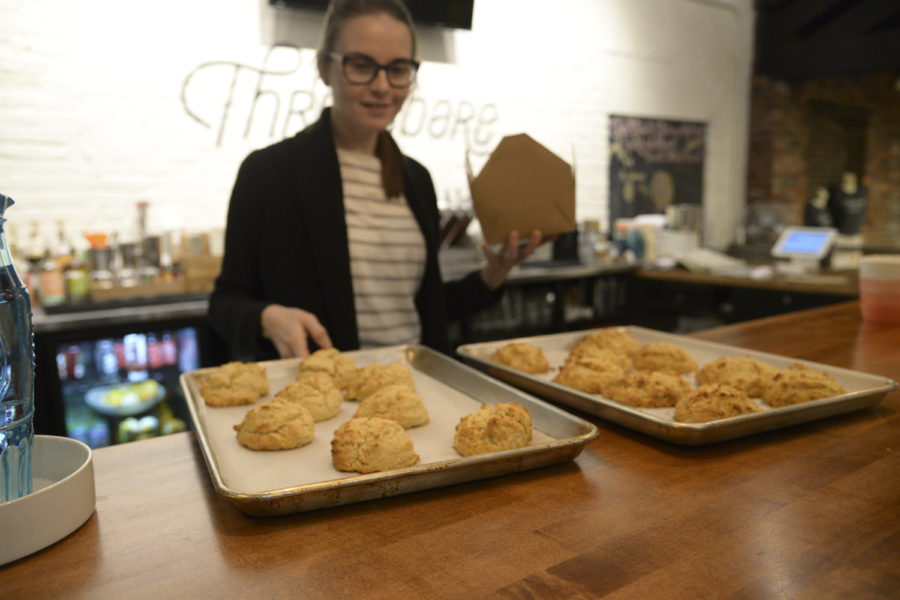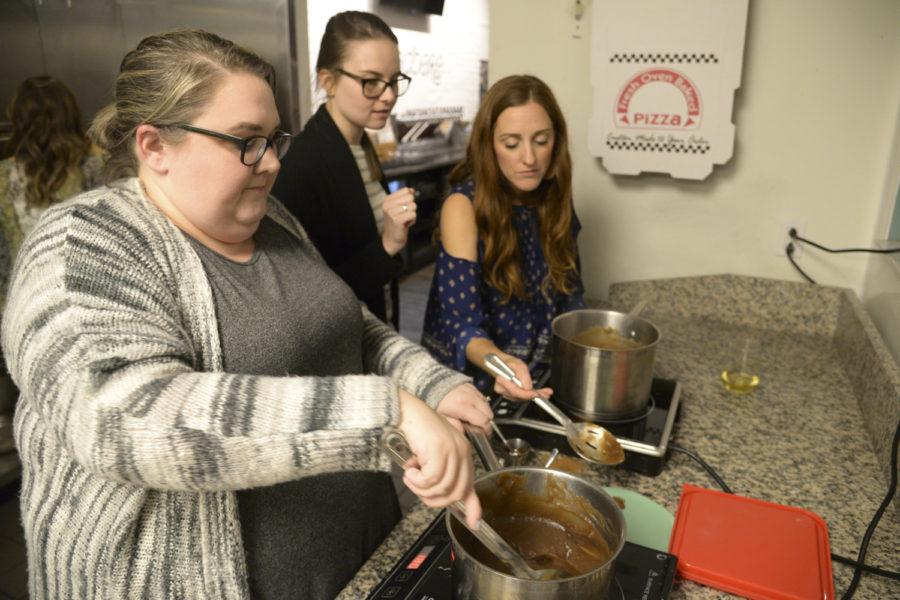An appeeling treat: The art of making apple butter
You butter believe they know their way around apples.
Anna Bongardino | Visual Editor
Missy Chafin (left) of Ross Township and Margaret Mullinary (right) of West View spoon their apple butter onto a plate to taste it before taking it off the burner.
For this distillery, cider is surely the apple of its eye — but there’s room for apple butter, too.
At an apple butter- and biscuit-making class at Threadbare Cider House in North Side Monday evening, students of all ages sipped one of the distillery’s homemade ciders and stirred their pots of simmering apple butter spiced with clove, nutmeg and cinnamon.
Threadbare Cider House is a local distillery that celebrates both the culinary and aesthetic aspects of the apple and is teaching others to appreciate it too. The family company began five years ago creating simple whiskeys that had a splash of apple cider. This drink expanded into different kinds of yeasts and ferments, and soon after, the company expanded into a second barrelhouse built in the 1840’s with a 10,000-square-foot tannery — a location they have now turned into a cider house.
The former tannery shows no trace of its previous role. The dining area features high ceilings, industrial beams and an accent wall behind the bar, painted white with the cider house’s name scrawled in black script.
The company’s work with apples is inspired by Johnny Chapman, or Johnny Appleseed — a 19th-century pioneer nurseryman who planted apple nurseries throughout the mid-Atlantic and left them in the care of locals.
“To own land at that time, you had to own a prescribed number of apple trees,” said Devon Murdoch, an employee at Threadbare who bartends, serves and works at private events. “Appleseed said, ‘You can buy these off of me and you can own this land now.’”
Threadbare prides itself on making cider differently than other cideries — they use more delicate yeast than other cider companies, which allows for more delicate and complex flavors, but also yields more complications. Made this way, cider needs to be crafted carefully, with employees constantly checking up on the mixture.
According to Murdoch, the fermentation of the yeast is what allows for different flavor profiles in the cider.
“Depending on the yeast, depending on the style of cider — the flavor profile they want — it could take anywhere from two weeks to two months,” she said, referring to the time it takes the cider to ferment. “That’s where all the magic happens — it happens in those fermentation tanks.”

Threadbare Cider House’s 900-gallon fermentation tanks brew the batches’ juice into alcoholic apple cider.
With variations of the fall drink being exported out to the community, the cider house also receives many incoming guests, who visit the site for family tours, dinners and cooking classes.
“Sometimes, Mondays and Wednesdays we’ll have a cheese class and an apple butter class. It’s picked up more often in the past couple of weeks,” Murdoch said. “We’re trying to do a big focus on cooking — sharing skills of cooking.”
Aside from the fresh cider, one of Threadbare’s biggest hits is its homemade apple butter. Murdoch likes to let her guests participate in terms of flavor during her apple butter class, letting attendees chose the amount of spice they want in their apple butter.
“People come in with different taste buds and different experiences with what they want,” she said. “It all depends on the type of person coming in.”
Missy Chafin, a resident of Ross Township, and her family of apple butter-lovers know the taste elements of a reliably made apple butter.
“When you get [apple butter] from a store, its not dark at all, so it just tastes more like an applesauce. And you want it to taste … I guess, like, nuttier.” Chafin said. “It’s like an applesauce mixed with caramel.”
Elise Miranda, programs manager and part-time pastry chef, pureed the apples for the apple butter- and biscuit-class attendees, completing half of the lengthy process for the students. Each students’ four pounds of apples produced approximately one quart of apple butter after they added spices such as cinnamon, nutmeg, cloves and sugar to the puree.

Threadbare’s programs manager Elise Miranda boxes attendees’ biscuits at the end of the apple butter- and biscuit-making class Monday evening.
Once the puree reached a darkened color and thick consistency, students taste-tested their creation before jarring it in a container to bring home and serve with the baked goods of their choice.
Threadbare doesn’t just serve apple products either. They experiment with making different fruit ciders like cherry, pear and watermelon, which doesn’t lend well to cider. In addition, they add different flavors for holidays, like this year’s popular Mother’s Day rosé cider.
“They’ll especially try to introduce seasonal things … so we have fall spice, we’re gonna have a Christmas blend coming out soon, so they try to keep it seasonal,” Murdoch said. “We usually have our flagships, which is farmhouse, dry, dry hopped.”
With this space just celebrating its first birthday this October, Threadbare lets others utilize its space.
“We have dozens of events a week,” Miranda said. “People rent out the space to have parties or nonprofits rent out the space and they get a portion of the proceeds.
In addition to the community aspect of Threadbare, it also sees itself above other more traditional breweries, where cider typically comes from.
“We consider our cider more like an apple wine more than a beer … we are really trying to market ourselves as a cider business that operates more like a winery,” Miranda said. “Other cider houses will let you take home their cider in a growler. We only sell them in wine bottles.”
It seems Threadbare is able to turn apple products into anything — and that’s its intention. By aiming to emphasize the not-so-obvious aspects of apples, the cider house has found a way to create a business that revolves around the apple’s crispy skin and delicious flavor.
“We really wanna highlight the [varieties] of apples that aren’t as well-known … We really wanna taste apples for what they are and celebrate them in their differences and how they weren’t always the same back then,” Murdoch said.







